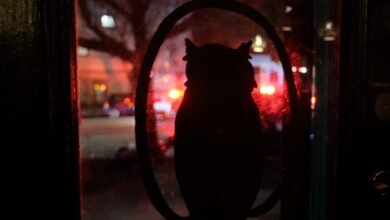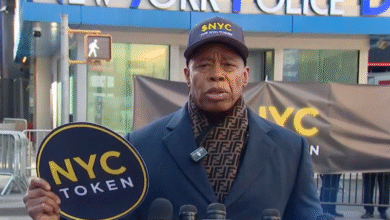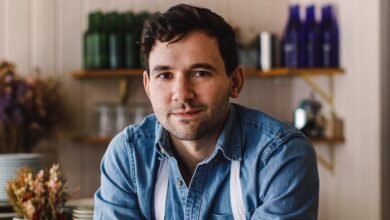Tweaking the quotidian: 30 years of street art pranksters Skewville

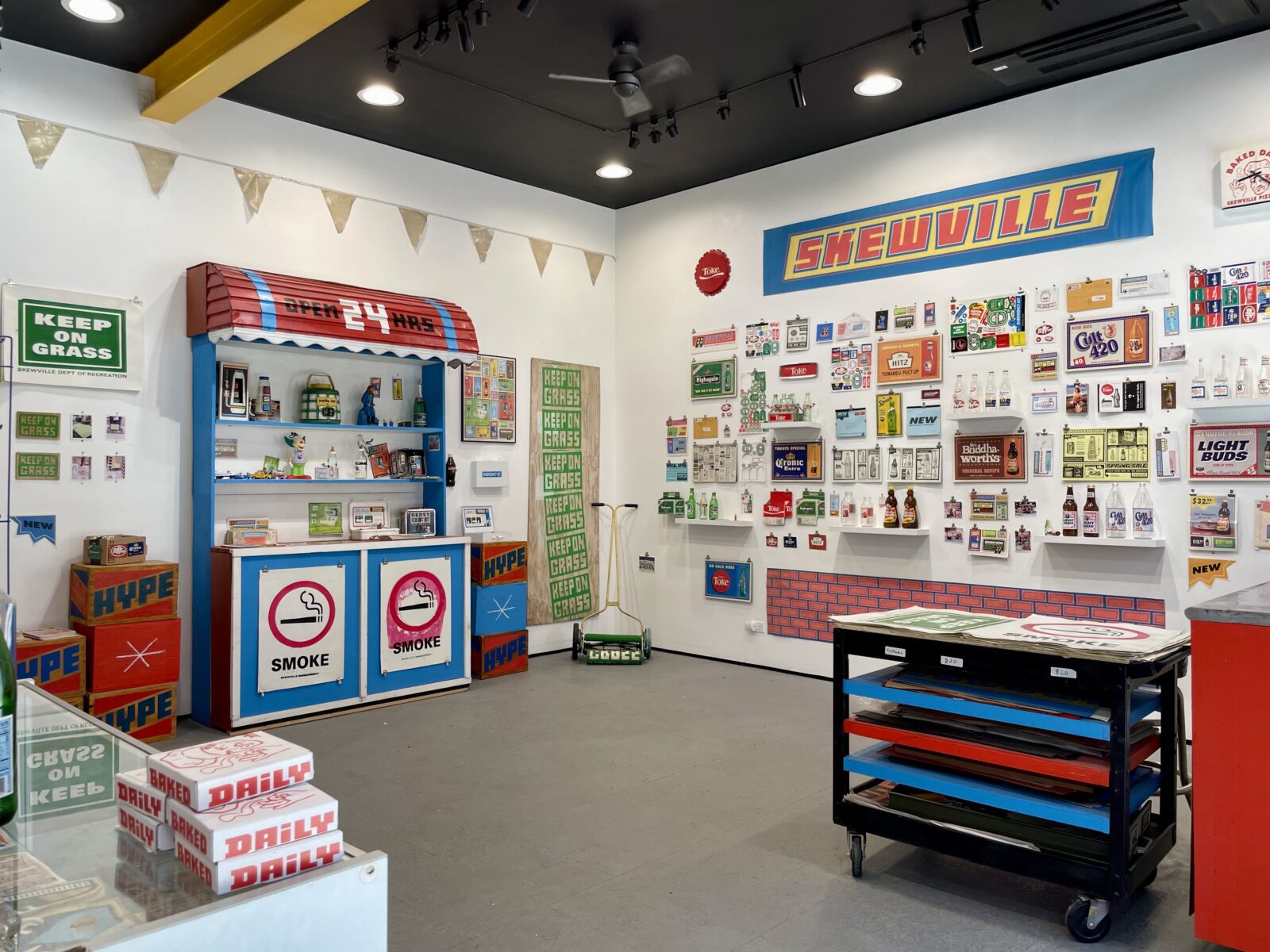
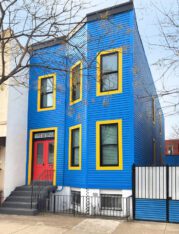
The house that street art built (Courtesy of Skewville)
One eye-catching blue rowhouse on Starr Street blends into the colorful cacophony around the Jefferson L stop. You might not notice the neat yellow trim on its windows, or the scarlet door crowned with the name “Skewville” in geometric print. Just up the discrete driveway and behind the house sits a converted horse stable packed with upcycled sculptures — a cartoony oasis in Mondrian hues.
“Skewville represents the weirdness of street art as it existed back in the day before it was popular or anyone was paying attention,” says counterculture reporter Carlo McCormick regarding the art partnership this house is named after, now 30 years in the making. “They’re the sly and slapstick humor or the street, those recognizable but radical interventions in urban experience that serve no better function than to tweak the quotidian and make us laugh.”
Last Saturday, street artists Ad Deville and his wife Kate (better known as the poet-performer My Life in Yellow) welcomed the public to officially christen that backyard stable as an art gallery. The couple will host 10 group and solo shows there starting now, through early winter.
But this is hardly just another gallery. Ad’s already run those — and has sworn he’d never do it again. Plus, Kate’s more interested in highlighting emerging artists with unconventional art practices. Most of their shows will focus on quasi-legal street artists. Each will open with a classic Skewville blowout, featuring DJs, drinks and free weed. The couple already did trial runs with several informal shows in the space last year, which featured inventive activities like a vegetarian Beyond Burger BBQ and a scavenger hunt for the work of acclaimed artist Stikman.
‘I’m excited to build people up,” says Kate of their mission to discover and elevate unappreciated artists. “Trying to think of ways to not be an art gallery that just has cheap wine.”
Skewville’s inaugural gallery season will span digital, street and fine art. The first show, now on view, presents work by Ad’s twin brother Droo, an integral part of Skewville since its founding in the 1990s. Droo’s debut show spans assemblages of antiques and never-before-seen paintings.
“Who better to oversee and present our culture than those creating it,” says Martyn Reed, the founder of early street art festival Nuart in Norway. “Whilst the likes of Deitch, Pace, and Zwirner have their place, artist-run spaces will always remain a few grimy and dirty steps ahead.”
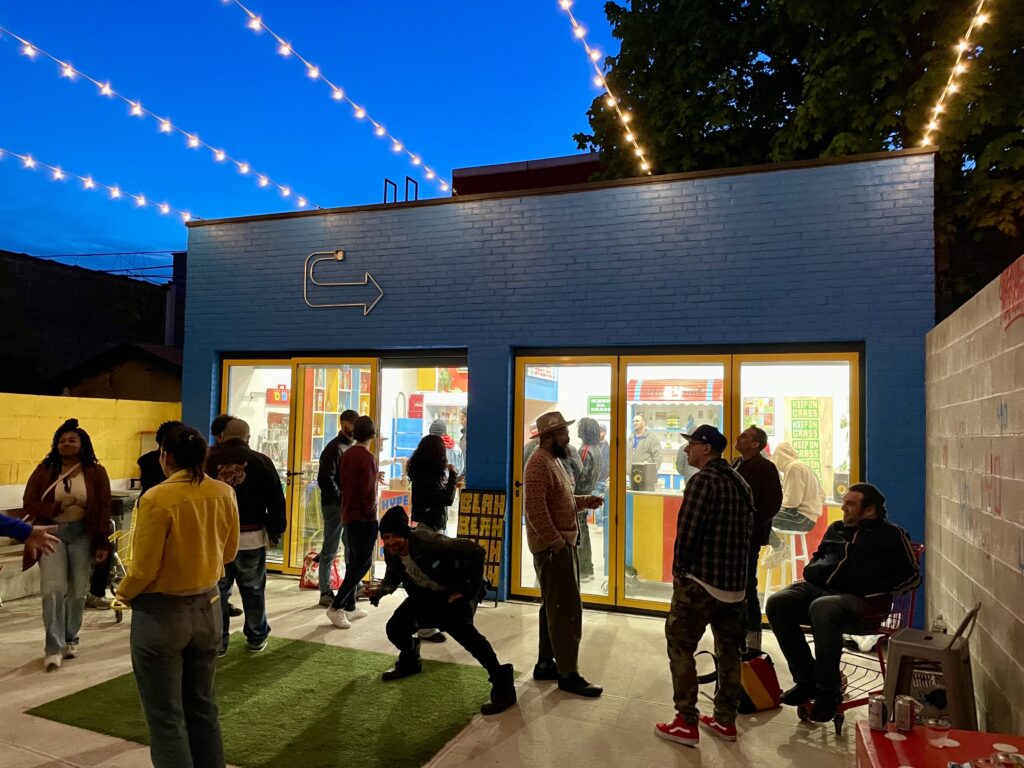
The Skewville gallery space at a recent party (Photo courtesy of Skewville)
From Sneaker Mission to indie art space
Skewville started off solely as a creative concept, the product of Ad and Droo’s shared penchant for art and shenanigans. The twins grew up on a now-gone rural lot in Queens with Italian parents, three more siblings, a grandmother and four Vietnamese foster siblings. The whole squad reliably shared dinner after long days spent, as the twins say, like “Lord of the Flies” meets “The Brady Bunch.” They graduated from dismantling and reassembling Fisher Price toys to selling bongs made from ketchup and beer bottles. Droo does the material engineering, and Ad uses his background in art and advertising to adorn each work with Skewville’s style.
Their most iconic project, the Sneaker Mission, kicked off in 1999, when Droo got the idea to cut flat sneaker silhouettes from wood, connect them with cords, and throw them over telephone wires. On the rare occasion that police have caught them going up, they didn’t even know what type of vandalism to charge them with, Ad has said. Graffiti is a sport, but Skewville is a game.
The Sneaker Mission generated a lot of hype, especially as street art spawned from graffiti — and achieved mainstream acclaim. Like many fans, Reed recalls learning of Skewville all the way across the Atlantic in the early aughts, “alongside the likes of Darius and Downey, Swoon, Revs and Cost and that whole scene that developed around the burgeoning ‘paste up’ scene.”
The twins kept making geometric, vintage-inspired art that poked fun at fame, but when Droo started a family, Ad leaned in harder. “The wooden sneakers are iconic of course,” Reed says, but “paradoxically, had they just produced and continued this single work and act they’d no doubt be far more well known, much in the way Invader ran with the tiles.”
In 2002, Ad and his girlfriend Pufferella moved into a storefront on the Lower East Side where they ran Orchard Street Art gallery through 2007. They moved to Bushwick in 2008 and opened Factory Fresh, which helped pioneer art in Bushwick, until their relationship buckled in 2015.

Inside the house (Courtesy Skewville)
It took Ad years to get his affairs in order. He acquired the current Skewville building in 2018, and transformed the row home by hand over the next two years, adding bright walls, checked floors, and that iconic staircase. The new Skewville hosted its first semi-public party in summer 2020. Ad made art in the basement while he continued fixing up the backyard space, which he originally intended to function as his workspace and studio. He finished that in summer 2021.
Sparks flew when Ad met Kate outside of The Other Art Fair that June. They share an affinity for primary colors, and a hands-on approach to life. Kate grew up in Pennsylvania, and was married and working a dissatisfying marketing gig in Lancaster when she began an affair her husband later discovered. Then, Kate moved to New York in 2010 for a fresh start. Her poetry identity as My Life In Yellow took root during that transition as a blog about her move. Soon, she was writing poetry on yellow stickers, dotting the city with bits of her soul — and amassing fans.
Last spring, Kate and Ad hosted a tricked-out wedding at Skewville. It was street art’s social occasion of the season, red carpet and all. “We had such a great time planning the wedding, creating an event,” Kate explains. When Kate moved in, Ad moved from the basement to the first floor. Because of that, his studio moved from out back to below their home, freeing up the space in the backyard. Ad and Kate started hosting comedy gigs, yoga classes and one-off art shows there, including an all black-white-and-yellow group show that Kate curated last summer.
They started to consider running a more concrete gallery after Darkcloud’s 20th anniversary show last August. At the opening, Stikman’s wife pulled Kate aside and asked about getting him a show. They invested in a point of purchase, fixed their website, and started envisioning ideas.
Then it got cold.
Introducing old heads to newbies
Ad and Kate closed the space while they planned this summer’s gallery lineup. Most of the artists that will be featured in the coming months are friends they admire. After Droo, the toy designer and NFT artist Mumbot will integrate her characters into Skewville’s aesthetic. Then, downtown advertising-executive-turned-street-artist SacSix will paint the whole space in his new Urban Zen Gardens — fire hydrants ringed in transcendent black lines. After that, Chelsea-based Clown Soldier will debut fine art that pushes his wheatpaste practice.
June will bring the next Beyond Burger BBQ, perhaps with brand sponsorship this time, serving up meatless patties and the first-ever collaborative artworks by Ad and Kate. In August, Skewville will honor the art world’s summertime group show tradition by presenting two of their own — including one curated by tastemaking L.A. gallery Thinkspace to wish a happy birthday to Halo Pig, an early “flickrazzi” who disseminated street art photos online, in the era before Instagram. In September, Skewville will celebrate 25 years of the Sneaker Mission by providing renowned street artists with their own pairs to decorate. Something like a hundred sets of sneakers, including deep cuts from the Skewville vault, will dangle throughout the gallery.
Ad expects graffiti writer EKG’s “Final Transmission” show in October to be a highlight of the whole year. EKG gained city-wide notoriety during the 2000s for tagging his infinity symbol almost everywhere. He got busted so many times that he had to change his tag to an EKG. Age has kept him off the streets recently, so now EKG is documenting his work.
Ad says these are the shows he’s most interested in hosting, “showing the history of street art for people who don’t know these old timers,” thus helping street art newcomers learn the ropes.
“As street art evolves into this global phenomena of grand murals and selfie-magnets, arising as a culture of place-making, tourism and real estate development, Skewville is the odd distant relative telling stories of the dumb, deranged and dangerous joys that once were, and still can be, whenever kids play in the streets without adult supervision,” McCormick says.
Yes, real street art still happens in Bushwick. As always, Skewville is hidden in the heart of the madness.
Droo’s “Dis-Conjoined” is on view at Skewville through April 20. The opening event for Mumbot’s “Between the Lines” exhibit will be on May 4, 6 to 10 p.m. See all upcoming events and exhibits here. Skewville is at 237 Starr Street.
The post Tweaking the quotidian: 30 years of street art pranksters Skewville appeared first on Brooklyn Magazine.

